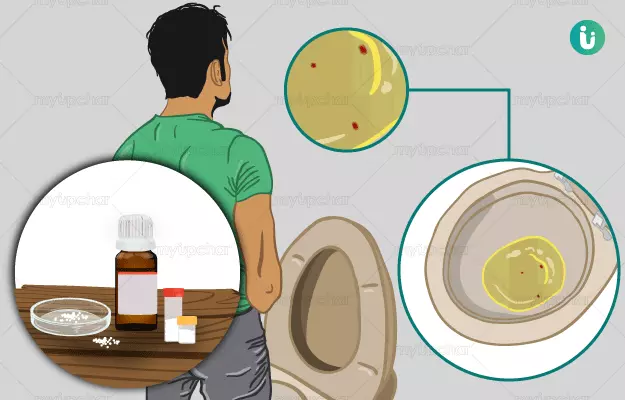Blood in urine, also known as haematuria, is an indication of an underlying problem with your kidneys or urinary tract. In gross haematuria, blood is visible in the urine, whereas in microscopic haematuria, it is detected only under the microscope and is not visible to the naked eye. You are likely to get haematuria if you have any of the following conditions:
- A family history of renal disease
- History of kidney stones
- Enlarged prostate in men
- Taking certain medications like blood thinners, aspirin or other pain-relieving medicines or antibiotics
There may be a number of causes of blood in urine such as strenuous activity, menstruation in females, injury, viral infection, sexual activity or urinary tract infection. Some serious health problems that can cause you to have blood in urine are:
- Polycystic kidney disease
- Sickle cell disease
- Kidney or bladder cancer
- Clotting disorder of the blood
- Swelling or irritation in the kidneys, prostate in men or any part of the urinary tract
Blood in the urine may give the urine a maroon, pink, red or dark smoky colour. Certain food colours also cause red-coloured urine. Hence, your doctor will get the urine sample tested to confirm for the presence of blood. Treatment will depend upon the cause of blood in urine, e.g., antibiotics are used for the treatment of urinary tract infection. Homeopathy can be used as an adjunctive therapy with conventional treatment to manage hematuria. Since your doctor has to wait for the culture result for conventional treatment, homeopathic treatment can be started meanwhile to reduce the symptoms. Homeopathic treatment initially acts by reducing the infection and then by improving general health. Homeopathic medicines like cantharis vesicatoria, nux vomica, and sarsaparilla officinalis work on urinary tract infections, lycopodium clavatum, pulsatilla pratensis, causticum and belladonna are useful in treating urinary calculi, and lycopodium clavatum and pulsatilla pratensis are effective in cases of enlarged prostate as well.
Medicines like aconitum napellus, apis mellifica, arnica montana, belladonna, berberis vulgaris, cannabis sativa, cantharis vesicatoria, carbolicum acidum, equisetum hyemale, erigeron canadense, lycopodium clavatum, phosphorus, sarsaparilla officinalis, senecio aureus, nux vomica and nitricum acidum are few of the medicines used for treating haematuria.


























